EYFS
Welcome to the Early Years Foundation Stage
Every child deserves the best possible start in their education and through parental and teacher support they can reach their potential. The EYFS year will lay the foundations to enable your child to become an independent and self-motivated learner throughout their whole school life.
The Foundation Stage follows a unique curriculum that enables every child to have the best possible start in life. We understand that children develop from different starting points and will be working at different stages to one another in the early years and we believe that our curriculum celebrates this
Our Curriculum
Children develop quickly in the Early Years and we aim to capture their eagerness to learn in all areas of the curriculum. As well as following the new ‘Early Years Foundation Stage Profile’ Curriculum we use the new Development Matters Framework to support our planning and assessment on a regular basis. Therefore, all staff know the stage all individual children are working at and use assessment to facilitate and move learning on to enable the children to make progress. The Curriculum comprises of seven areas of learning and development:
The 7 areas of learning in the EYFS
There are seven areas of learning and development in the EYFS. All areas of learning and development is important and inter-connected. Three areas are particularly crucial for igniting children’s curiosity and enthusiasm for learning, and for building their capacity to learn, form relationships and thrive. These three areas, the prime areas, are:
Prime Areas of Learning
- Communication and Language development of children’s spoken language underpins all seven areas of learning and development. This involves providing a language rich environment with extensive opportunties to use and embed new words in a range of contexts. Through conversations, storytelling and role play, the children share their ideas with support and modelling from the EYFS team, and questioning invites them to elaborate.
- Physical Development is vital in children’s all-round development, enabling them to pursue happy, healthy and active lives. The EYFS team help children to develop their core strength, stability, balance, spatial awareness, co-ordination and agility through providing play opportunities in both indoors and outdoors.
- Personal, social and emotional development is crucial for children to lead healthy and happy lives, and is fundamental to their cognitive ability. This involves forming strong and supportive relationships with the EYFS team which enables the children to understand their own feelings and feelings of others. Children are also supported to manage emotions, develop a positive sense of self, develop freindships, set themselves simple goals, have confidence in their own abilities, to persist and to understand appropriate behaviour.
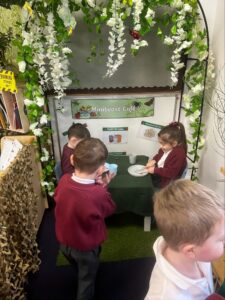 |
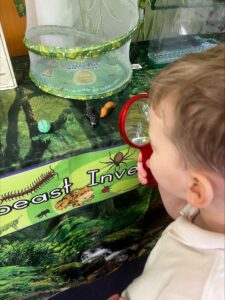 |
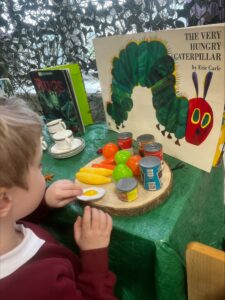 |
We also provide support for children in four specific areas, through which the three prime areas are strengthened and applied. The specific areas are:
Specific Areas of Learning
- Literacy development is crucial to develop a life-long love of reading. This involves encouraging children to link sounds and letters and to begin to read and write using our Read, Write Inc. programme. Children are given access to a wide range of reading materials (books, poems, and other written materials) to ignite their interest.
- Mathematics is essential in developing a strong grounding in number so children develop the necessary building blocks to excel in Maths. This involves providing children with opportunities to develop and improve their skills in counting, to subitise, understanding and using numbers, calculating simple addition and subtraction problems; and to describe shapes, spaces, and measures.
- Understanding the World involves guiding children to make sense of their physical world and their community by increasing their knowledge and sense of the world through visiting local places and meeting important members of society. In addition, listening to a broad selection of books will foster their understanding of our culturally, socially, technologoically and ecologically diverse world.
- Expressive arts and design development supports the children’s imagination and creativity. This involves enabling children to explore and play with a wide range of media and materials, as well as providing opportunities and encouragement for sharing their thoughts, ideas and feelings through a variety of activities.
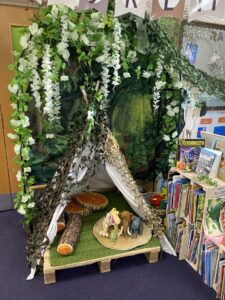
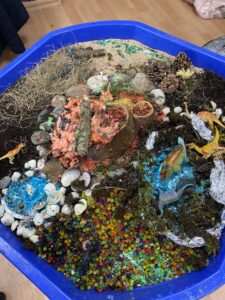
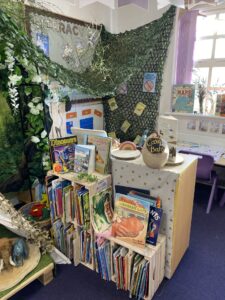
Characteristics of Effective Learning
Playing and exploring – engagement: Finding out and exploring, playing with what the children know, being willing to ‘have a go’.
Active learning – motivation: Being involved and concentrating, perseverance, enjoying achieving what they set out to do.
Creating and thinking critically – thinking: Having their own ideas, making links, choosing ways to do things.
Achievement of these Prime and Specific Areas of Learning is reached by putting the Characteristics at the heart of all we do. This ensures all children are exposed to a broad and balanced curriculum. Children become self-motivated learners who embrace challenge and are inspired to learn. They are able to fulfil their potential and develop the skills necessary for success.
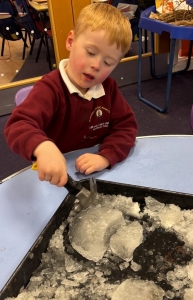 |
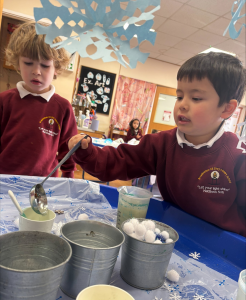 |
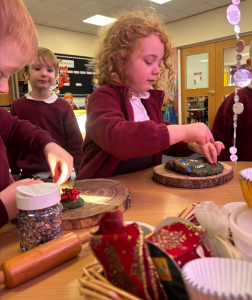 |
 |
How do we learn?
We know that children learn best when they are given practical and first-hand experiences.
Providing high quality planned experiences for children’s play is an important way for adults to support children’s learning that is both enjoyable and challenging. When children play, they are learning at the highest level. Play can extend certain areas of their learning – for example, developing language skills by promoting talk between children or introducing new vocabulary that they use and act out in their play.
Each day the children have short teacher led lessons such as Phonics and Maths, but they are also encouraged to independently complete challenging activities across the curriculum that match their individual requirements and help them achieve their next steps.
There is a seamless link between the indoor and outdoor learning environment which children access all day and in all weathers!
- In the EYFS children’s natural, exploratory drive is developed through their self-directed play.
- A child initiated (self-initiated) activity is an activity wholly decided on by the child itself and is the result of an intrinsic motivation to explore a project, or express an idea.
- The learning environment is organised in such a way that children can find and access resources for themselves. This promotes independence and responsibility.
- We ensure that there is a balance of adult-led and freely chosen or child-initiated activities, delivered through indoor and outdoor play.
- Outdoor learning has equal value to indoor learning.
- Outdoor learning has a positive impact on children’s well-being and development
Learning Outdoors
At Broadbottom we believe that outdoor learning is as a vital component of early childhood development, which offers children the opportunities to explore, experiment, and engage in active, hands-on experiences that promote learning across all areas of the framework.
By embedding outdoor learning into the EYFS curriculum, educators create opportunities for holistic development, nurturing a lifelong connection to the environment and fostering essential life skills.
Broadbottom offers an extensive outdoor provision for EYFS, with a bespoke Early Years area dedicated to the EYFS areas of learning. Plus a playground, which hosts a large selcetion of stimulating outdoor play equipment, designed to promote health and well being for our children.
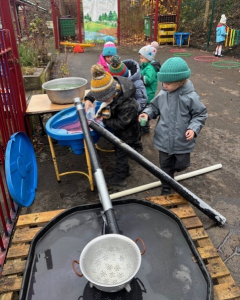 |
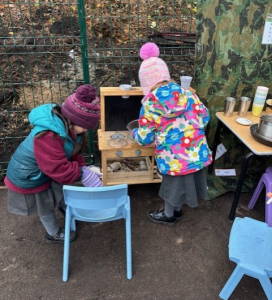 |
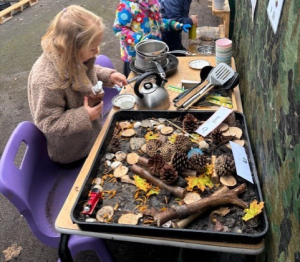 |
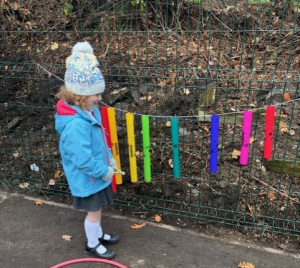 |
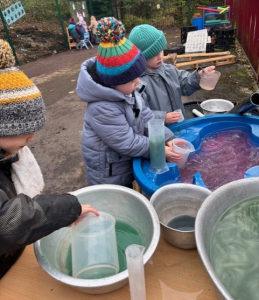 |
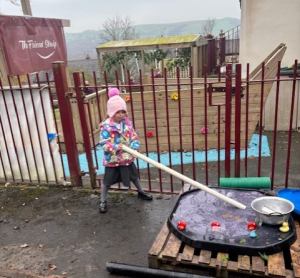 |
As children progress through the Reception year, more adult initiated activities are introduced, to prepare them for their transition into Year 1.
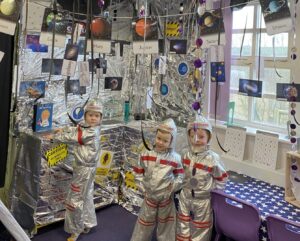 |
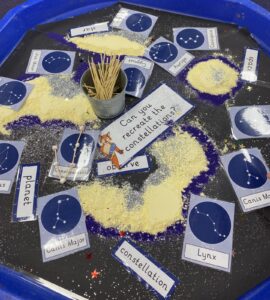 |
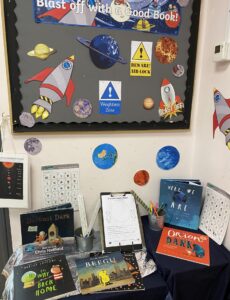 |
Parental Links
We use Class Dojo to capture your child’s learning and share some of the exciting experiences they have with us. Over time it will tell a story about your child such as; their learning, friends and the activities they enjoy sharing with others. The EYFS team observe each child because it helps us to understand and support their individual well-being and development. All parents have access to their child’s secure portfolio.
In addition to the above, we regularly share photos to our class story on Class Dojo to share with parents what the children are learning in school. Parents also are able to add to their child’s individual portfolio so the EYFS team have a full picture of the children’s development.
Our relationship with parents or carers is fundamental to our work in the EYFS. Staff are always available in the playground before and after school and more personal individual parental meetings can be arranged after school if and when appropriate. We nurture an environment of open communication and accessibility so that children can enjoy their Reception year to the full.
Reading and Phonics s
At Broadbottom CE (VC) Primary school, we are members and work closely with Lacey Green Primary Academy who were chosen by the DfE in 2019 to be one of the 34 English Hubs across England. The aims of the English Hubs are to promote a love of reading and support schools across the country to provide excellent phonics and early language teaching. Here at Broadbottom CE (VC) Primary School, we use the Read Write Inc (RWI) programme to get children off to a flying start with their Phonics and Reading. Teaching of phonics starts as soon as the children start school. We strongly believe that being able to read opens the doors to all areas of learning which is why we put a strong emphasis on the early teaching of Phonics and Reading.
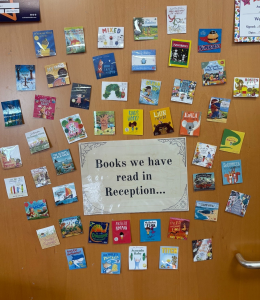 |
Policy |
Phonics Policy |
Top-ten-tips-for-sharing-stories-at-home |
Number Formation Practise |
FRED TALKRWI SUPPORT AT HOME |
MATHS SUPPORT AT HOME |
For more information regarding early years developmental milestones, you can search for Development Matters online.